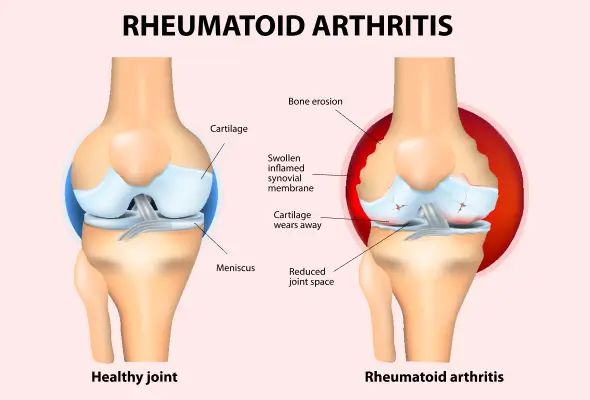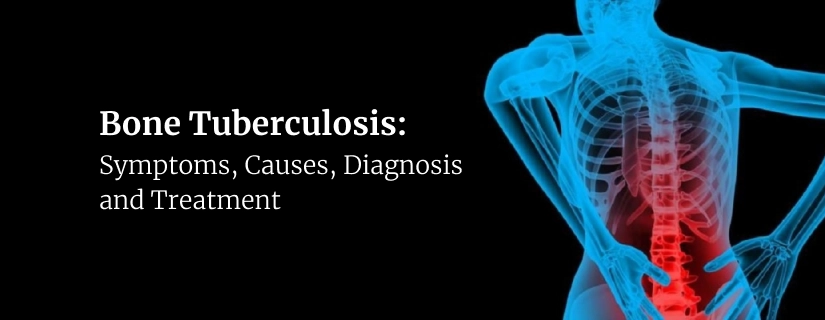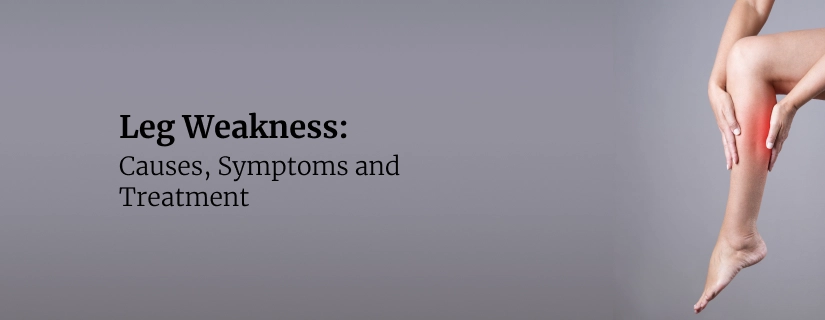-
Doctors
-
Specialities & Treatments
Centre of Excellence
Specialties
Treatments and Procedures
Hospitals & Directions HyderabadCARE Hospitals, Banjara Hills CARE Outpatient Centre, Banjara Hills CARE Hospitals, HITEC City CARE Hospitals, Nampally Gurunanak CARE Hospitals, Musheerabad CARE Hospitals Outpatient Centre, HITEC City CARE Hospitals, Malakpet
HyderabadCARE Hospitals, Banjara Hills CARE Outpatient Centre, Banjara Hills CARE Hospitals, HITEC City CARE Hospitals, Nampally Gurunanak CARE Hospitals, Musheerabad CARE Hospitals Outpatient Centre, HITEC City CARE Hospitals, Malakpet Raipur
Raipur
 Bhubaneswar
Bhubaneswar Visakhapatnam
Visakhapatnam
 Nagpur
Nagpur
 Indore
Indore
 Chh. Sambhajinagar
Chh. SambhajinagarClinics & Medical Centers
Book an AppointmentContact Us
Online Lab Reports
Book an Appointment
Consult Super-Specialist Doctors at CARE Hospitals
Rheumatoid Arthritis (RA): Symptoms, Causes, Diagnosis, and Treatment
Updated on 5 March 2024

Table of Content
- What is Rheumatoid Arthritis (RA)?
- Types of Rheumatoid Arthritis
- Stages of Rheumatoid Arthritis
- Signs and Symptoms of Rheumatoid Arthritis (RA)
- What Causes RA?
- Risk Factors for RA
- How is RA Diagnosed?
- Treatment of Rheumatoid Arthritis
- Complications of Rheumatoid Arthritis
- Lifestyle Changes to Manage Rheumatoid Arthritis
- Home Remedies
- When to See a Doctor?
- Conclusion
- FAQs
Rheumatoid Arthritis is a chronic autoimmune disorder that causes inflammation of the joints and results in pain. It is an illness that often results in very debilitating conditions and poor quality of life for those affected. It may severely injure the tissue around the joints as well as the joints itself when left unattended. It could lead to heart, lung, or neurological disorders. To cope with this disease successfully one should be aware about every aspect —from types and symptoms through treatment possibilities.

What is Rheumatoid Arthritis (RA)?
Rheumatoid arthritis is a form of autoimmune condition that attacks joints and causes infection, swelling, and ache. It differs from other types of arthritis in the way it affects the joints on both facets of the body.
Types of Rheumatoid Arthritis
Rheumatoid arthritis can manifest in various forms, each with its unique characteristics. Understanding these types is essential for tailoring cures for rheumatoid arthritis. The main types of RA include:
- Seropositive RA: If you have seropositive RA, your blood contains antibodies that might damage your body and cause joint inflammation. If you have a positive blood test for the antibody anti-cyclic citrullinated peptide (anti-CCP) or the protein known as rheumatoid factor (RF), your body may be actively generating an immune response against normal tissues.
- Seronegative RA: If you have seronegative it means that either there aren’t any anti-CCPs in the blood or very minimal quantities. If you’re a case of seronegative RA, it means that the symptoms are still present in your body and the anti– CCP test is negative. This form may be difficult to diagnose since it does not have specific biomarkers.
- Juvenile Rheumatoid Arthritis (JRA): The juvenile idiopathic arthritis is the name for a disease of children aged 17 years and below. Some of these symptoms may be inflammation, stiffness, fever rash and swollen lymph nodes as any RA type. In order to manage this condition in children, early identification and treatment is necessary.
Stages of Rheumatoid Arthritis
- Stage 1: In the initial stage of rheumatoid arthritis, the tissue surrounding your joints becomes inflamed. You may experience some pain and stiffness, but if your doctor orders X-rays, there won't be any signs of bone damage.
- Stage 2: At this stage, the inflammation has started to harm the cartilage in your joints. You might notice increased stiffness and a reduced range of motion.
- Stage 3: The inflammation becomes so intense that it begins to damage your bones. You will likely experience more pain, greater stiffness, and even less range of motion than in Stage 2. Physical changes may also start to become noticeable.
- Stage 4: In this final stage, the inflammation subsides, but your joints continue to deteriorate. You will suffer from severe pain, swelling, stiffness, and a significant loss of mobility.
Signs and Symptoms of Rheumatoid Arthritis (RA)
Recognizing the rheumatoid arthritis symptoms is crucial for early diagnosis and effective management. The common signs of rheumatoid arthritis include:
- Persistent pain and swelling, often affecting multiple joints, especially smaller joints like those in the hands and feet.
- Stiffness in the joints, particularly in the morning or after periods of inactivity, lasting for more than 30 minutes.
- Overwhelming fatigue and a general sense of malaise, which can significantly impact daily activities.
- Over time, RA can lead to joint deformities and loss of joint function.
- Some of the systemic symptoms of rheumatoid arthritis include fever, weight loss and anaemia.
Early rheumatoid arthritis usually starts affecting smaller joints, especially the ones connecting your toe and finger to foot. As the disease takes its course, severe rheumatoid arthritis symptoms often tend to expand from wrists and knees towards elbows, hips or shoulders. Typically, both sides of your joints are affected.
What Causes RA?
Rheumatoid arthritis is an autoimmune condition. Typically, the immune system helps in protecting your body from illnesses and infections. Your immune system targets the good tissue in your joints when you have rheumatoid arthritis. Your heart, lungs, nerves, eyes, and skin may also get affected as a result of it. The exact rheumatoid arthritis causes remain unknown, however it is widely accepted that a combination of genetic and environmental elements contributes to this disease. Some potential rheumatoid arthritis causes include:
- Age: Adults of any age may be affected with rheumatoid arthritis, but the majority of cases are discovered among the age group 40 to 60.
- Genetics: Individuals with a family history of RA can also have an multiplied risk of developing the condition suggesting a genetic predisposition.
- Environmental factors: Exposure to positive environmental factors, along with smoking, may increase the threat of growing RA, specially in genetically inclined people.
- Infections: Some infections have been linked to the development of rheumatoid arthritis, although the exact relationship is complex and not fully understood.
Risk Factors for RA
Some risk factors of rheumatoid arthritis (RA) include:
- Genetics: Individuals with certain genes from birth are predisposed to RA. Furthermore, the HLA (human leukocyte antigen) class II genotypes that result from these genes may increase your risk of arthritis.
- Sex: Women are 2 to 3 times more likely than men to develop RA.
- Age: Although RA can start at any age, the likelihood of getting it rises with age. The majority of people in their 60s experience the onset of RA.
- Smoking: Smoking significantly increases risk of RA and worsens symptoms.
- Obesity: Obesity can raise one's chance of getting RA.
- Family history: Having a close relative with RA raises your risk.
- Previous infections: Certain viruses, like Epstein-Barr, may be triggers.
- Diet: Sugary drinks, red meat, and processed foods linked to higher risk.
- Stress: Stress, according to some studies, could contribute to RA. For instance, symptoms may get worse due to the body's response to stress.
- Environmental toxins: Second-hand smoke, asbestos, and silica dust are linked with an increased risk of this condition.
How is RA Diagnosed?
Diagnosing rheumatoid arthritis involves a combination of:
- Medical history and physical examination: Your doctor will inquire about the nature, severity, and duration of your symptoms. After that, they will evaluate range of motion, stiffness, edema, and joint discomfort.
- Blood tests: These measure particular antibodies like, rheumatoid factor, anti-cyclic citrullinated peptide), as well as inflammatory indicators, C-reactive protein, erythrocyte sedimentation rate.
- Imaging tests: To check for indications that your joints are deteriorating, your rheumatologist may prescribe imaging studies. X-rays reveal joint damage, while ultrasounds and MRIs provide detailed views of soft tissues and bone erosion.
Treatment of Rheumatoid Arthritis
Rheumatoid arthritis is treated with medication, surgery, treatments, and alterations in lifestyle. When choosing rheumatoid arthritis treatment, your doctor takes into account your age, health, medical history, and the severity of your symptoms. Following are the commonly suggested treatments for RA:
- Medication
- Rheumatoid arthritis is typically treated using the following medications:
- Nonsteroidal anti-inflammatory drugs (NSAIDs): Used for rheumatoid arthritis pain relief and inflammation (ibuprofen, naproxen).
- Disease-modifying antirheumatic drugs (DMARDs): Slow disease progression and prevent joint damage.
- Corticosteroids: Powerful anti-inflammatory drugs for severe flares (prednisone), typically used in short bursts.
- Biologic therapies: Your doctor could recommend biologic response agents (biologics) if you don't react well to DMARDs. The chemicals that induce inflammation in your joints are the focus of biologics.
- Therapies
- Physical therapy: Exercises to improve joint function, flexibility, and strength.
- Occupational therapy: Strategies for daily tasks and joint protection.
- Pain management: Techniques like cognitive behavioral therapy, relaxation, and heat/cold therapy.
- Surgery
- In severe cases, joint replacement surgery can improve function and rheumatoid arthritis pain. If medicine isn't controlling your pain, the doctor could potentially suggest surgery. Treatments for RA with surgery include:
- Knee replacement.
- Hip replacement.
- Other surgeries to correct a deformity.
Complications of Rheumatoid Arthritis
Rheumatoid arthritis (RA) can lead to various complications beyond joint pain. Here are some common complications related to RA:
- Joint Damage: Over time, RA can cause damage to the joints, leading to deformities and loss of function, making it hard to perform daily activities.
- Fatigue: Many people with RA experience extreme tiredness, often due to chronic pain and inflammation.
- Heart Problems: RA can increase the risk of heart disease. Inflammation may contribute to the buildup of plaque in the arteries, which can lead to heart attacks or strokes.
- Lung Issues: RA can affect the lungs, causing conditions that make breathing difficult, such as inflammation and scarring.
- Increased Infections: Treatments for RA, especially those that suppress the immune system, can make it easier to get infections.
- Eye Problems: People with RA may have eye issues, such as dryness or inflammation, which can lead to pain or vision problems.
- Anemia: Chronic inflammation can lead to anemia, causing symptoms like fatigue and weakness.
- Mental Health Effects: Living with RA can lead to anxiety or depression due to the challenges of managing chronic pain.
Lifestyle Changes to Manage Rheumatoid Arthritis
Living with a lifelong condition like rheumatoid arthritis (RA) can sometimes make you feel like you have little control over your quality of life. While there are certain aspects of RA that are beyond your control, there are also steps you can take to enhance your well-being.
Here are some important lifestyle changes to consider:
- Rest: When your joints are inflamed, there’s a higher risk of injuring them and the surrounding soft tissues, such as tendons and ligaments. Therefore, it’s essential to give your inflamed joints the rest they need. However, it's also crucial to engage in exercise. Keeping your joints flexible and maintaining overall fitness are vital for managing RA.
- Exercise: Pain and stiffness might slow you down, leading some people with rheumatoid arthritis to become less active. Unfortunately, being inactive can result in reduced joint motion and muscle strength, which in turn can decrease joint stability and increase pain and fatigue. Regular exercise can help prevent and even reverse these negative effects. It’s a good idea to consult with a physical or occupational therapist for guidance on safe exercise routines. Beneficial types of workouts include:
- Range-of-motion exercises to maintain and restore joint flexibility.
- Strength training exercises to build muscle.
- Endurance exercises, such as walking, swimming, or cycling, to improve overall stamina.
Home Remedies
Here are some home remedies you can try that may help ease your rheumatoid arthritis (RA) symptoms:
- Fish Oil: These supplements might help reduce pain and stiffness associated with RA. However, if you decide to take them, be aware that they can cause side effects like nausea, indigestion, and a fishy aftertaste. Additionally, fish oil can interact with certain medications, so it's important to consult your doctor before starting.
- Plant Oils: Oils such as evening primrose, borage, and black currant may help lessen pain and morning stiffness. Some people experience headaches or an upset stomach when taking these oils. They can also interfere with medications and potentially affect liver health, so it’s wise to discuss their use with your doctor to see if they might be beneficial for you.
- Tai Chi: This gentle form of exercise combines slow movements, stretches, and deep breathing. Research suggests it may improve the quality of life for those with RA. When practiced with a qualified instructor, tai chi is generally safe, but it’s important to avoid any movements that cause pain.
When to See a Doctor?
Early diagnosis and intervention are crucial for effectively managing rheumatoid arthritis. It's important to consult a doctor if you experience:
- Persistent joint pain and swelling.
- Morning stiffness lasting more than 30 minutes.
- Fatigue and weakness impacting daily activities.
- Joint deformities or loss of joint function.
Conclusion
Rheumatoid arthritis can have a major influence on a person's life. Investigations about the reasons and possible therapies for RA are being made on a regular basis, which gives those who suffer from this difficult illness hope for better results and better quality of life.
FAQs
Q1. Can I live a long life with rheumatoid arthritis?
Ans. Yes, with proper medical management, lifestyle adjustments, and advances in treatment, many individuals with rheumatoid arthritis can lead fulfilling and long lives.
Q2. What foods are not good for rheumatoid arthritis?
Ans. Processed food heavy in carbohydrates and trans fats, together with a diet strong in red meat, can make rheumatoid arthritis patients' symptoms worse and increase inflammation. It may be advantageous to follow a balanced diet that prioritizes foods high in omega-3 fatty acids and anti-inflammatory fruits and vegetables.
Q3. Is rheumatoid arthritis serious?
Ans. Rheumatoid arthritis is a serious autoimmune disease that can impair quality of life overall, cause disability, and destroy joints if left untreated. Its severity can be reduced and results can be improved with early diagnosis and appropriate medical care.
Q4. Will changing my diet help my rheumatoid arthritis?
Ans. Yes, modifying your diet can help manage rheumatoid arthritis. A balanced diet rich in fruits, vegetables, whole grains, and healthy fats may reduce inflammation and improve symptoms. Foods high in omega-3 fatty acids, like fatty fish, can also be beneficial.
Q5. Is rheumatoid arthritis genetic?
Ans. Yes, rheumatoid arthritis can have a genetic component. If you have a family history of RA, your risk of developing it may be higher, but environmental factors also play a significant role.
Q6. Does rheumatoid arthritis cause fatigue?
Ans. Yes, fatigue is a common symptom of rheumatoid arthritis. Chronic pain and inflammation can lead to exhaustion, making it challenging to maintain energy levels.
Q7. What’s the age of onset for rheumatoid arthritis?
Ans. Rheumatoid arthritis can occur at any age, but it usually develops between 30 and 60 years old. However, children and older adults can also be affected.
Q8. When is surgery needed for rheumatoid arthritis?
Ans. Surgery may be necessary for rheumatoid arthritis if joint damage is severe and conservative treatments (like medications and physical therapy) are ineffective. Surgical options can include joint replacement or repair.
Q9. Why are rest and exercise important for RA?
Ans. Rest helps reduce inflammation and fatigue, while exercise strengthens muscles and improves flexibility, aiding joint health. A balanced approach of both is essential for managing RA effectively.
Q10. Can I live a normal life with rheumatoid arthritis?
Ans. Yes, many people with rheumatoid arthritis live full, active lives. With effective treatment and lifestyle adjustments, you can manage your symptoms and maintain a good quality of life.
Q11. What foods are not to eat with rheumatoid arthritis?
Ans. Avoid processed foods, sugary snacks, excessive alcohol, and high-fat foods, as they can increase inflammation. Some individuals may also find that nightshade vegetables (like tomatoes and potatoes) trigger symptoms.
Q12. What is the safest drug for rheumatoid arthritis?
Ans. The safest drug depends on individual circumstances, but many start with nonsteroidal anti-inflammatory drugs (NSAIDs) or disease-modifying antirheumatic drugs (DMARDs) like methotrexate. Consult your doctor to find the best treatment for you.
Q13. Is walking good for rheumatoid arthritis?
Ans. Yes, walking is beneficial for rheumatoid arthritis. It helps maintain joint mobility and strengthens surrounding muscles without putting excessive strain on the joints.
Q14. At what age does rheumatism start?
Ans. Rheumatism is a broad term that can refer to various conditions, including rheumatoid arthritis. RA commonly begins between the ages of 30 and 60, but it can develop at any age.

ENQUIRY FORM
SELECT CATEGORIES
-
Neurosciences (16)
-
Neurology (37)
-
Neurosurgery (14)
-
Orthopaedics (48)
-
Oncology (33)
-
Obstetrics and gynecology (51)
-
Pulmonology (23)
-
Urology (20)
-
Nephrology (13)
-
Psychiatry (7)
-
Dietetics and Nutrition (111)
-
General Medicine (63)
-
Cardiac Sciences (30)
-
Vascular & Endovascular Surgery and Interventional Radiology (10)
-
Gastroenterology (46)
-
Endocrinology (23)
-
Plastic Surgery (10)
-
Critical Care Medicine (5)
-
COVID-19 (16)
-
Dermatology (16)
-
Emergency Care (1)
-
Ophthalmology (4)
-
Pediatrics (14)
-
Laparoscopic and Bariatric Surgery (8)
-
ENT (15)
-
Kidney Transplant (1)
-
Liver Transplantation and Hepatobiliary Surgery (5)
-
General Surgery (3)
-
Internal Medicine (5)
-
Medicine Information
Numbness in Feet: Causes, Symptoms, Treatment and Home Remedies
Swelling in Feet: Causes, Treatment and Home Remedies
YOU MAY ALSO LIKE
RECENT BLOGS
-

Direct Anterior Approach in Total Hip Replacement: Advantages and Challenges
10 April 2025
Read More
-

Zinc Deficiency: Signs and Symptoms, Causes, Treatment
9 April 2025
Read More
-

Chest Pain When Coughing: Causes, Treatment and Home Remedies
9 April 2025
Read More
-

12 Health Benefits of Eating Mushrooms
8 April 2025
Read More
-

7 Health Benefits of Blood Donation You Should Know About
8 April 2025
Read More
-

Implantation Bleeding Vs Periods: Know the Difference
28 February 2025
Read More
-

Bloating During Ovulation: Symptoms, Causes and Remedies
28 February 2025
Read More
-

Itching During Dengue: Causes, Treatment and Home Remedies
18 February 2025
Read More
Have a Question?
If you cannot find answers to your queries, please fill out the enquiry form or call the number below. We will contact you shortly.













































